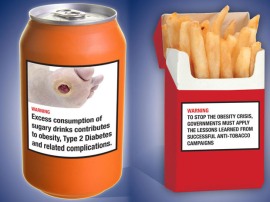Hi again,
Yesterday I watched television for the first time since I am here in UK and as in Italy, I faced a lot of commercials especially linked with food, which of course lead to one of my greatest problem: food’s consumption.
Imagine the scene: I am relaxed, sitting on my sofa and watching a good movie. Suddenly, it stops and the commercials start to be broadcasted, nothing wrong, except that the greater part of them is food advertisements. All of a sudden I start to feel very hungry and I can’t stop myself to go and eat something, which is, the most of the time, a junk food. I know myself; I know that I’m really a weak person in this point of view but after watching those commercials, it seems that you have to eat something to make the movie much more beautiful and excited.
Since I’m not the only one who behaves like this, I start to think how influent foods’ commercials are with consumers’ behaviour. In particular, I start to think that if these ads are so effective with adults, they could have a greater effect on children.
A lot of studies confirm my assumption.
First of all, Borzekowsky and Robinson (2001) suggest that food’s commercials can actually affect pre-scholar children’s food preferences. They try to demonstrate this hypothesis in an experiment, in which children see a videotape of a famous cartoon with or without foods’ commercials. The results show that commercials have a great influence in the short-term food’s preferences. In particular, they find out that only 1 or 2 exposures are enough for 10- 30 sec. commercials to persuade children. In addition to that, I get to know that this great power is linked only with food; when the researchers make the same experiment with toys’ commercials, the children don’t seem to be so gullible as in the previous trials. The authors try to explain it with the fact that maybe children don’t choose toys leaded by short-term preferences. Moreover, in the toys’ ads, there are a lot of colour changes and this could distract children’s attention.
So, food’s commercial could have a great power on children, and on me of course, but this could become a problem if a great number of TV commercials are linked with junk food.
In this interesting article: “The effects of television advertisements for junk food versus nutritious food on children’s food attitudes and preferences”, the authors explain that the longer is the time children pass in front of the television, the more positive will be their attitude towards junk food advertisements, which are the most frequently ads broadcasted during children’s TV shows. Children who spend a lot of time watching television, start to create beliefs in agreement with the ones passed by commercials; for example, they start to think that eating food every day is a normal behaviour and that it is a good behave because a lot of people do it. For these reasons, the authors suggest that it could be useful to implement these ads with healthy food commercials. They did some researches and found out that the impact of healthy food’s commercials works only if they are not followed by the junky ones. This could be explained by the fact that the healthy ads are trying to change a normal message children get used to. In fact, children are accustomed to watch junk food commercials during their television time, so seeing different kinds of ads could not bring the expected responses.
…And then, the society is scandalised by the sharp increase of obesity among children.
I’m not so surprised. If junk food is now seen as the normal every day food, the increasing number of obese on the streets is a logical consequence. Come on, don’t hide yourself behind a finger.
The worst thing is that, as Halford, Gillespie, Brown, Pontin&Dovey (2004) demonstrate, obese and overweight children could faster recognise food’s adverts than the non-food ones. In contrast it doesn’t happen with their normal weight peers. Secondly, the results show that the view of food commercials are significantly linked with the consumption of the advertised food. Even if all children eat more after watching commercials, the amount of food’s intake is grater among overweight and obese children, even when they’re watching non-food ads.
All these researches make me think a lot about this problem and, according to the nutritional consultant, Adrienne Dorf, I think that parents have to be more involved with this problem. They should help their children to be more aware that the thing they see on screen, especially adverts are not true, and the food they see is not healthy for them.
Since we can’t change the society, we should try to start from the little things.
Regarding me, I’m a hopeless case, but I’m 24, I’m aware of everything and if I want to go with the flow, it’s only my choice and I have to face the consequences.










Love your post, Emma!
I have always been worried about in the future my children will sink in the junk food. Maybe it’s a too-early worry. But after seeing so many young children just addicted to fatty so-called fashioned food in ads, I really cannot help myself.
As you putting in your blog, the vivid advertisements just push junk food to the child. These advertising people always make junk food be seen as exciting and cool.
I read some research results about how the contents of social motivation influence audiences’ attitudes toward advertising products:
Griskevicius, V., Ackerman, J. M., Van den Bergh, B., & Li, Y. J. (2011). Fundamental Motives and Business Decisions. In Evolutionary Psychology in the Business Sciences (pp. 17-40). Springer Berlin Heidelberg.
That leave me thinking that if ads for junk food is broadcasting after idol plays, things may be worse. Idol’s image arose adolescents’ motivation on pursue fashion. Then the cool and vivid food advertisements must be more persuasive.
LikeLike
I agree that advertisements can increase the amount of food that children consume. Research has shown that children in America were exposed to 15 TV adverts for each, making it a total of (almost) 5,500 food ads a year; with 98% of these adverts promoting food that was high in salts, fats and sugars (Lobstein et al., 2009).
A study conducted by Harris, Bargh, and Brownell (2009)investigated into the effects of food adverts on children. In the experiment they asked children to watch a cartoon with advert breaks. The 118 children were divided into two groups; in one condition they were shown food adverts (experimental group) and in the other condition they were shown non-food adverts (control group). After the cartoon the experimenters provided snakes and measured how much the children ate. They found the children in experiment condition ate 45% more snakes than the control group.
Harris, Bargh, and Brownell (2009) also investigated whether this effect was present in adults. In a similar experiment they found that adults in the experimental group with food adverts ate more than the control. What was interesting was that the adults in the experimental group reported that they had no memory of food adverts being played, suggesting that these adverts connect with us on an unconscious level.
LikeLike
When the the first time I arrived UK to do my undergraduate final year,the whole year I was eating the most junk food in my entire life. I never ate that much of junk food back in Malaysia. I don’t know why but somehow i did managed to control it.
However, when kids encounter with junk food or low nutritional food, this seems not right. Often advertised products used licensed characters such as SpongeBob Square Pants for entertainment use to influence positive perceptions of advertised food. Several studies found that children prefer the taste of food advertised with popular character comparing with the same food (http://www.sciencedirect.com/science/article/pii/S1499404613001127). This shows how powerful advertisement is on influencing children perceptions. Especially with cereal brands, often we see cartoon character that marketer try to associate with children to persuade their parents to turn into buying decision. Yet, the limit use of popular children characters in any child targeted food advertising can be part of healthful diet.
LikeLike
Food glorious food, in your conclusion you spoke about how are 24 and how aware you are about food consumption but what I feel this blog didn’t talk about is the worrying element of food advertising to children and their overexposure to unhealthy food advertisements (http://www.esrc.ac.uk/_images/briefing-unhealthy-ads_tcm8-24202.pdf) This paper talked about how Ofcom has introduced regulations to banning the advertising of foods. After the ban was introduced it was found that the exposure of children to unhealthy food advertising remained the same despite the ban because the tv shows the children watched were not regulated under the ban. Therefore Emma should Ofcom introduce either outright ban on the advertising of unhealthy foods or a set of regulations and a committee that monitors these regulations and implements punishments such as fines when necessary. In order to reduce unhealthy food consumption within the UK as obesity is becoming more and more prevalent here.
LikeLike